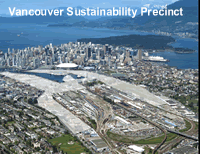

Municipalities pursue own energy projects
By Charlie Smith
The Georgia Straight
Publish Date: 6-Oct-2005
Thomas Osdoba is working on a sustainable energy precinct for Vancouver.
While senior governments have mostly ignored the impact of a global peak in oil production (see previous story), some municipal and regional governments have decided to generate their own energy. The City of Vancouver, the City of North Vancouver, and the District of West Vancouver have created or are developing their own projects within their communities.
Meanwhile, the Greater Vancouver Regional District collects approximately $5 million each year by generating electricity at its Burnaby waste incinerator and selling it to B.C. Hydro. The GVRD is also examining the possibility of generating wind power at the Iona Jetty and at Pitt Lake. In addition, the GVRD is considering installing a microgenerator to generate electricity from water flowing through pipes linking the Capilano and Seymour reservoirs.
Tom Osdoba is the manager of the City of Vancouver’s sustainability group, which is working on the creation of a 200-hectare energy precinct covering much of False Creek Flats and southeast False Creek. Osdoba told the Georgia Straight that it’s very difficult to create new energy systems one parcel at a time, which is why the city is examining the concept over a large area.
“You get economies of scale and better opportunities not only to reduce energy use but to identify sources of energy that are greener and cleaner and less dependent on fossil fuels,” Osdoba said.
The city has hired a consultant to examine the business case and capital costs of creating a new utility for the area.
This “community energy system” would share heat and power loads in a connected loop of pipes. Power could be fed into the system from solar, wind, or hydrogen sources.
The City of North Vancouver owns the Lower Lonsdale Energy Corporation, which has a partnership with Terasen Utility Service to distribute steam heat created by burning natural gas. The District of West Vancouver is offsetting some of its municipal costs with a microturbine at Eagle Lake.
Osdoba said the City of Vancouver is also trying to reduce emissions by both downsizing the civic fleet of vehicles and obtaining energy-efficient “smart cars”. On September 22, the sustainability office also launched the city’s “One Day” initiative with a car-free celebration in Gastown. He said that the city is encouraging residents to reduce energy consumption by starting with small steps. “If you drive to work every day, try to take the bus or try to bike just one day a week. Or car pool,” he said.
Osdoba said that the impetus for “One Day” and other sustainability initiatives have come from Mayor Larry Campbell and city council. Vancouver COPE Coun. David Cadman was one of the first politicians in the country to anticipate the potential consequences of a global peak in oil production. Cadman, former president of the Society Promoting Environmental Conservation, also appeared on the Vancouver Planetarium stage with Richard Heinberg, Julian Darley, and Bill Rees to discuss this topic in May 2003.
Cadman told the Straight that he thinks every new building in this city will have to be as energy-efficient as possible. He also said that Cool Vancouver—a citywide initiative to address climate change, which he quarterbacked—was designed to ratchet down energy consumption to ensure costs remained neutral for taxpayers.
“Obviously, with rising prices, the less you consume, the more you can begin to flatline your costing,” Cadman said. “We’re going to have to be even more rigorous about that in the years to come.”
The city’s three TransLink directors—Cadman, Campbell, and Vision Vancouver Coun. Raymond Louie—also voted to buy natural-gas buses for the regional transit fleet over the objections of staff and TransLink chairman Doug McCallum.
Perhaps the most ardent environmentalist on council, however, is COPE’s Fred Bass. He told the Straight that he entered municipal politics because he believes that local governments can change the world. He claimed that it happened during the 1980s, when local peace movements and civic bodies around the globe brought pressure on national governments. This resulted in a landmark disarmament agreement between then–U.S. president Ronald Reagan and Soviet leader Mikhail Gorbachev.
Bass noted that in the 1990s, local governments were the first to ban tobacco use inside buildings and in bars and restaurants. Senior governments followed. More recently, the City of Vancouver has pioneered the four-pillars drug-addiction strategy, which viewed drug addiction as a medical issue and led to the creation of the country’s first supervised injection site. Bass said municipal governments can also lead the way in dealing with emissions that contribute to global warming. He also noted that there is a limited supply of oil, which will lead to higher prices in the future. “On top of that, it is a totally nonrenewable resource,” Bass said. “When our great-grandchildren hear that we took oil and burned it in cars and generated CO2 and pollutants into the sky—and didn’t get more out of this nonrenewable resource—they’re going to be very disappointed with what we did.”
He emphasized that the reason he became a city councillor was to reduce the uncontrolled emission of greenhouse gases, which he described as an “emergency” for the world to address.
The Georgia Straight
GVRD's Waste-to-Energy Factsheet
The Burnaby Waste-to-Energy Facility, built in 1998, generates 15 MW of electricity and provides steam to an integrated co-generation facility and an adjacent paper recycling mill.
GVRD Cache Creek Landfill gas collection
(gas is collected and flared, but projects to utilize the gas cannot be explored due to lack of funding.)
Vancouver Energy Precinct
Vancouver South East False Creek

Vancouver Sustainability Precinct

Lower Lonsdale Energy Corporation
West Vancouver's Green Energy Project (Eagle Lake)
BC Hydro's Eagle Lake micro hydro page